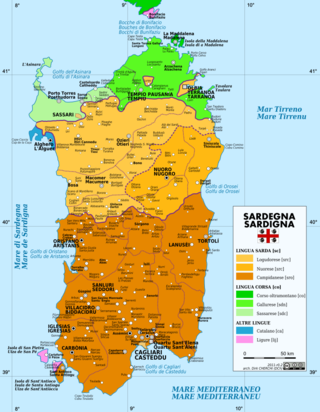Top Qs
Timeline
Chat
Perspective
Gallurese
Romance language spoken in northeastern Sardinia From Wikipedia, the free encyclopedia
Remove ads
Gallurese (gadduresu) is a Romance dialect of the Italo-Dalmatian family spoken in the region of Gallura, northeastern Sardinia. Gallurese is variously described as a distinct southern dialect of Corsican or transitional language of the dialect continuum between Corsican and Sardinian. "Gallurese International Day" (Ciurrata Internaziunali di la Linga Gadduresa) takes place each year in Palau (Sardinia) with the participation of orators from other areas, including Corsica.[5][6][7]
Gallurese is generally considered a southern Corsican dialect,[2] sharing close resemblance in morphology and vocabulary with the dialects of Sartene and Porto-Vecchio on Corsica, whereas its phonology and syntax are similar to those of Sardinian.[8] One third of Gallurese vocabulary is also influenced by Logudorese Sardinian, Catalan, and Spanish.[8]
The Sassarese language, spoken in the area of Sassari, shares similar transitional traits between Tuscan, Corsican and Sardinian but, in comparison with Gallurese, is definitely closer to the Logudorese dialects of Sardinian.
Remove ads
History
The most ancient literary sources in Gallurese date back to the early 17th century, mainly as poetry and religious odes. Some late Middle Age fragments suggest that the formation of the language could be dated to the early 15th century. The origin and the development of Gallurese are debated. Max Leopold Wagner and Maurice Le Lannou argued that successive migration waves from Southern Corsica, promoted under the Aragonese rule to repopulate an area devastated by famine and pandemics, were crucial in the formation of a transitional language.
Remove ads
Typical constitutional elements of Gallurese

- the plural form of nouns in -i (ghjanni or polti 'doors') are like in Corsican and Italian, and not as in -s like in Sardinian (jannas, portas), French, Spanish, Catalan, etc.
- Latin 'll' has become -dd- (like casteddu, coraddu 'castle', 'coral'), the same as in Sardinian, southern Corsican and Sicilian (but castellu, corallu in northern Corsican);
- -r- modified to -l- (poltu 'port', while portu in Corsican and Sardinian);
- -chj- and -ghj- sounds (ghjesgia 'church', occhji 'eyes'), like in Corsican, while Sardinian is cresia, ogros.
- articles lu, la, li, like in ancient Corsican dialects (u, a, i in modern Corsican, su, sa, sos, sas in Sardinian);
Remove ads
Relation to Corsican
Summarize
Perspective
Gallurese is classified by some linguists as a dialect of Corsican,[9][10][11] and by others as a dialect of Sardinian.[12] In any case, a great deal of similarity exists between Southern Corsican dialects and Gallurese, while there is relatively more distance from the neighbouring Sardinian varieties.
Concluding the debate speech, the Sardinian linguist Mauro Maxia stated as follows:
From a historical and geographic point of view, Gallurese might be classed either under Corsican or Sardinian, in light of its presence specific to Sardinia for the last six-seven centuries. From a linguistic point of view, Gallurese might be defined as:
- Predominantly Corsican on a phono-morphological level;
- Predominantly Sardinian on a syntactic level;
- Predominantly Corsican on a lexical level, with a lot of Sardinian, Catalan, and Spanish words, making up around 1/3 of the total vocabulary.
Gallurese is less Corsican than many scholars make it out to be. What makes Gallurese a different language from Corsican, rather than a Corsican dialect, are many grammatical features, especially related to syntax, and the significant number of Sardinian, Catalan and Spanish loanwords.
It can be therefore claimed that, from a grammatical and lexical point of view, Gallurese is a transitional language between Corsican and Sardinian.
— Mauro Maxia, Seminar on the Gallurese language, Palau 2014
The Regional Government of Sardinia has recognized Gallurese, along with Sassarese as separate languages, distinct from Sardinian.[13]
Sample of text
An excerpt from a hymn dedicated to the Virgin Mary.[14]
Remove ads
See also
Notes
- The grouping of Gallurese is disputed, although it is most commonly considered a dialect of Corsican[2] that is also similar or heavily influenced by Sardinian, Tuscan or standard Italian.
References
External links
Wikiwand - on
Seamless Wikipedia browsing. On steroids.
Remove ads

